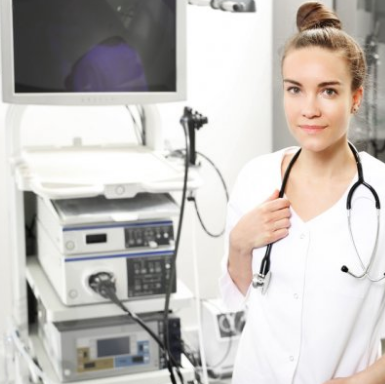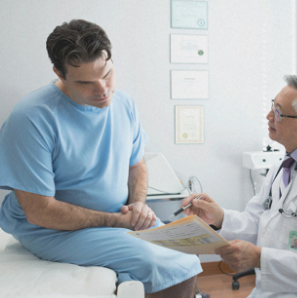What you need to know about a Rectoscopy
Contents
Rectoscopy is a simple diagnostic examination that allows your doctor to directly view the mucous membrane of the anus and the last part of the large intestine (also known as the colon). It is usually used to find the presence of abnormalities in this area. The goal of this examination is to diagnose changes in the rectum, diagnose changes in the anal canal, and to take a biopsy sample. This examination can identify:
-
Rectal polyps
-
Rectal inflammation
-
Rectal mucosal prolapse
-
Hemorrhoids
-
Fistulae
-
Rectal cancer
-
Colorectal cancer
-
Ulcerative colitis
-
Endometriosis
-
Diverticulosis.
Your doctor may suggest you undergo this procedure if you experience anal pain, stool evacuation difficulties, and fecal incontinence.
Rectoscopy is performed with a special instrument called a restscope, which is a 20 cm long rigid plastic tube with a light source. The procedure is always combined with rectal exploration, and, possibly, needle biopsy.

What does the Procedure Involve?
On the day of your Rectoscopy, you will need to empty your colon with enema about 1 to 2 hours before. In some cases, you may only be allowed to drink fluids on the day of the examination.
During Rectoscopy, you will have to lie on your back with your legs in two stirrups. Your doctor will lubricate the rectoscope and insert it into your rectum and further into the bowel. Then, a little puff of air is pumped into your rectum to inflate the bowel so that the mucous membrane can be seen clearly. If needed, fine needle or surface biopsy is taken.
Once your doctor finishes, the rectoscope is retrieved with circular movements so that the entire bowel is inspected.
Rectoscopy is typically not painful, but it may briefly cause some discomfort. In some cases, your doctor may give you a sedative to help you relax during the procedure.
How Long Should I Stay in the Area?
After Rectoscopy is complete, you can leave the hospital right away. If the procedure is not combined with biopsy, you can get the results on the same day and you can leave the area as soon as you wish. However, if the procedure is combined with biopsy, the results will not be available immediately, so you should plan to stay in the country for around 7 to 14 days. Once the results are ready, you will have to attend a follow-up appointment to discuss the results with your doctor. Sometimes, you can request the results to be mailed to you and discuss the results with your local doctor. In this case, you should be able to travel home the next day of your Rectoscopy.
What’s the Recovery Time?
There is little to no downtime after Rectoscopy. Unless you have had a sedative during the procedure, you can resume your normal activities, including work straight away. However, there might be some air in your digestive tract, which can cause bloating. You might also have some light bleeding from your rectum after the procedure. This is normal, particularly if you had a biopsy. If you experience any pain and discomfort, it is advisable that you take the day off and resume your normal activity the next day.
What About Aftercare?
Typically, no special aftercare is needed after Rectoscopy. You can return to normal exercise and eat your normal diet immediately. If your stomach is upset, try bland, low-fat foods, such as yogurt, plain rice, toast, and boiled chicken. You will need to ensure that you drink plenty of liquids.
If you take blood thinner medications, such as aspirin, ask your doctor when you can start taking it again.
What’s the Success Rate?
Rectoscopy is an effective procedure with high success rates. The results allow your doctor to make a diagnosis and create a treatment plan for you. This procedure is also considered very safe, but there are a few risks you need to be aware of, including belly pain, infection, and a tear in the rectum. All of these risks are rare and you can minimize them by following all of your doctor’s recommendations.
Are there Alternatives to Rectoscopy?
Your doctor may recommend the following examinations as the alternatives:
-
Colonoscopy – this procedure is another test your doctor can perform to view the inside of the colon and the rectum. It can screen the cause of problems, such as belly pain and rectal bleeding, and colon cancer. Colposcopy is performed with a Colonoscope, which is a thin, flexible tube with a light on its end. A colonoscope is longer than a rectoscope, and it can reach the whole length of the colon.
Sigmoidoscopy – this procedure is also used to diagnose problems of the colon and rectum, including colorectal cancer. It uses a thin, flexible tube called the sigmoidoscope. This tube is typically longer than a rectoscope, but shorter than a Colonoscope.
What Should You Expect Before and After the Procedure
Before Rectoscopy, you may be experiencing unexplained symptoms, such as anal pain and fecal incontinence. After the procedure, your doctor will be able to find the cause of your symptoms and make an accurate diagnosis. Your doctor may order other tests to confirm the diagnosis or create a treatment plan.
To check prices or to book a Rectoscopy Procedure, in Thailand or anywhere else in the world, head on over to MyMediTravel now!

